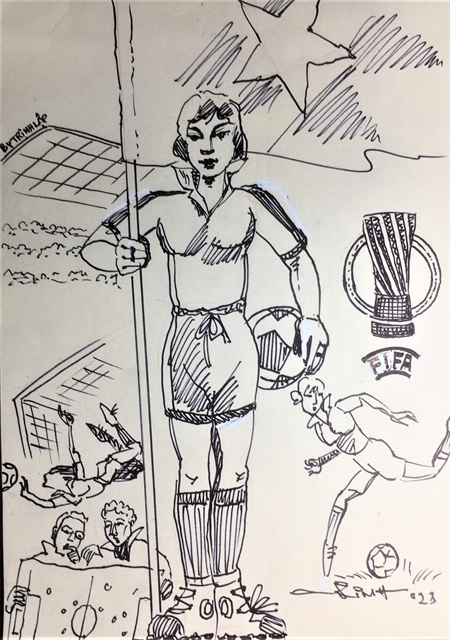 Talk Around Town
Talk Around Town


|
| Illustration by Trịnh Lập |
By Thanh Nga
The Vietnamese women's football team bid farewell to the 2023 FIFA Women’s World Cup and returned home on Thursday, having gained invaluable lessons and experiences that will shape the future of Vietnamese women's football.
Despite their best efforts, Việt Nam failed to score a goal in the World Cup due to the difference in class between them and their opponents. They lost all three matches, conceding a total of 12 goals: a 3-0 loss to the US, 2-0 to Portugal, and 7-0 to the Netherlands.
The class difference was evident in their inability to keep possession of the ball, as all three teams employed high-pressure tactics that made it difficult for the Vietnamese players to create any opportunities. When there was no ball in their possession, Vietnamese players could not play the game to their own tactics.
Coach Mai Đức Chung admitted after the match with the Netherlands that the result was normal given the level difference between Việt Nam and the Netherlands. He praised his team's spirit but acknowledged that they were outmatched in terms of professionalism.
"The result of losing 7-0 was normal given the level difference between Việt Nam and the Netherlands. However, we were very comfortable mentally. It's clear that our level was much lower. The Vietnamese players' spirit is excellent, but we lose due to our low professionalism before our rivals. In the three past matches we conceded 12 goals, obviously the level is still low."
Despite conceding 12 goals in three matches, the Vietnamese team's effort was commendable. Goalkeeper Kim Thanh faced a total of 96 shots, with opponents averaging 32 shots per game. This showed that the Vietnamese team was comprehensively inferior in terms of both individual and collective quality.
It is unfair to blame the players and Coach Chung for the team's performance. Regardless of the strategies that the team devised, they were outclassed by opponents who were superior in all aspects, including body size, physical strength, speed, and technique.
To make a significant impact in future tournaments, Vietnamese women's football needs to focus on player development, with youth training at the forefront.
Coach Chung provided opportunities for many young players, including Trần Thị Hải Linh, who played in two matches, Lương Thị Thu Thương, who played in three matches, as well as Ngân Thị Vạn Sự and Nguyễn Thị Thanh Nhã, during the 2023 World Cup.
As Việt Nam looks ahead towards the 2027 World Cup, the young generation, particularly players like Hải Linh and Thanh Nhã, will play a crucial role in shaping the future of Vietnamese women's football. Additionally, players born between 2000-2005 will be trained and directed towards replacing the current senior players on the national team.
The Vietnamese U20 team, coached by Akira Ijiri, have already secured a spot in the final round of the 2024 AFC U20 Women's Asian Cup. Which route they will develop is also the problem that the Việt Nam Football Federation and the women's team training board need to review after the World Cup.
However, Vietnamese women's football needs to broaden its youth training sources and not just focus on a few localities such as Hà Nội, HCM City and Hà Nam. This number is too small to train qualified players for bigger ambitions.
The national championship has only seven teams, with two being the sub-squad of Hà Nội and HCM City, representing only five provinces and cities across the country. The youth tournament and school football must also be developed further to create a solid foundation for peak football development.
Coach Chung emphasised that after the World Cup Vietnamese female players must set an example for young players to practise and encourage them to develop their skills, including increasing their height and mastering new techniques. Encouraging football practice in schools and promoting more football movements and tournaments throughout the country would also be essential.
He also said that Vietnamese women's football community having only five clubs was inadequate and needed to be expanded to provide more opportunities for players to develop and showcase their skills.
By inspiring young players, expanding football infrastructure, and investing in player development, Vietnamese women's football can continue to grow and achieve success on the world stage.
Việt Nam displayed great determination and dedication throughout the World Cup, and this quality has been passed down through generations and will continue to inspire the next generation. However, their failure in the tournament highlighted the fact that spirit alone is not enough, and Vietnamese women's football needs to chart a new course to ensure that their current efforts are not in vain.
As the team say farewell to the 2023 Women's World Cup as well as to Chung, the oldest coach of the event, there are many ways to reflect on their performance and move forward. By looking back with love and moving forward with the players' aspirations and resilience, Vietnamese women's football will continue to improve, even if progress takes time.
It is essential for the Vietnamese football industry in general, and women's football in particular, to have a team dedicated to researching and analysing trends, tactics, strategies, systems, and processes of the world's youth football training and developing a model that suits the country's conditions and circumstances. This will help Vietnamese women's football to shine on the world stage. VNS




